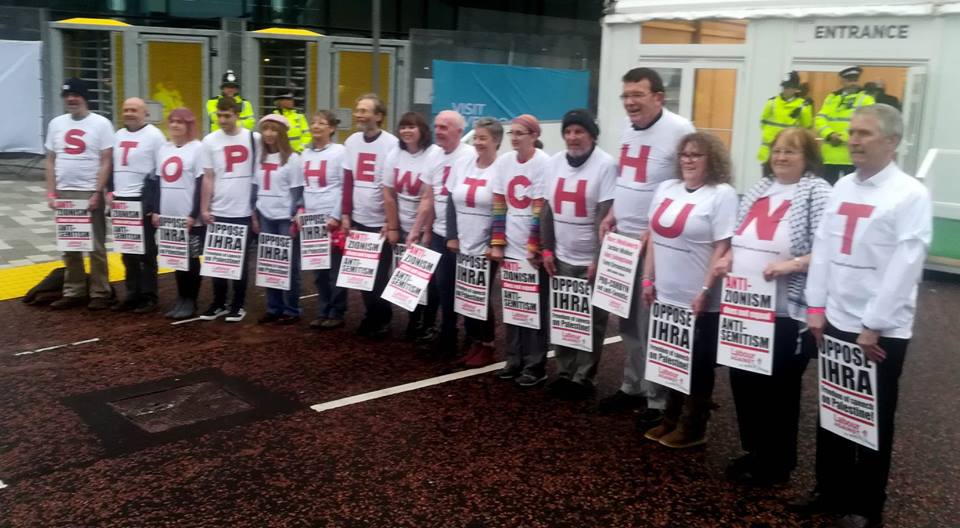William Sarsfield looks at the issues underlying the main point of controversy at the LAW conference
It was interesting that the most contentious discussion in Labour Against the Witchhunt’s February 2 all-members meeting was on the question of democracy and accountability in the campaign – specifically the method of election to our leadership group, the steering committee (SC). The political divide took concrete form in two amendments to LAW’s proposed constitution. Although not explicitly counterposed, these expressed very different views on a democratic culture in working class organisations, and conference took the right decision to take them together, as mutually exclusive, alternative political approaches.
An amendment submitted by Tina Werkmann – LAW’s membership secretary – proposed that “a simple majority at any all-member meeting can decide to appoint or recall a member of the steering committee”. This was vigorously opposed by leading SC member Tony Greenstein. His own amendment to the constitution draft called on conference to reject the section proposing that the SC “elects its own officers and sub-committees and can appoint new SC members”. His alternative substituted the annual general meeting for the SC, delegating it power to “elect a chair, vice-chair, secretary and treasurer, as well as up to four other members of the SC”, leaving the committee the power only to “[elect] its own sub-committees and … coopt up to four additional members”.
The real sting in the tail was the suggested benchmark for an all-members meeting to be able to remove an SC member – Tony proposed that officers (and, presumably, members of the SC without ‘portfolio’) could only be recalled after “a two-thirds majority” of an all-members meeting or AGM had been secured.
This is superficially attractive to many – it has the appearance of a democratic and inclusive measure. However, in truth, it is anything but.
A rough parallel is with the office of president of the USA – which essentially is an elected monarchy able to ignore, denigrate and/ or bypass the most representative constitutional institution, the House of Representatives. Likewise, a LAW officer elected to a post by the attendees of a particular national conference (or even as atomised individuals in an online poll, perhaps – a là Jon Lansman’s preferred method of bypassing democracy) would be able to disregard the views of others on the leading body; to claim a ‘mass’ mandate for their position – even if the comrades this person worked with on a day-to-day basis knew from direct experience that s/he was utterly useless. Electing officials in this way can degrade the selection process to the level of a popularity contest.
Again, these sorts of provisions are introduced in bourgeois ‘democratic’ institutions as an infrastructure of checks and balances against democracy; a method to distance the mass of people from genuine scrutiny and control over their elected representatives. Looking at this form of government in the 19th century United States, Marx branded it a “defiled democracy”. As alluded to above, comrade Greenstein was also keen for us to adopt the “defiled” provision of a two-thirds majority vote to remove members of the leadership body – again, a stipulation that resonates with the US requirement of a two-thirds majority in the Senate (the least representative institution in the constitutional framework) to impeach a president.
As exemplified in the turnover of elected representatives and rapid changes of political majorities in the tumultuous revolutionary upheaval of 1917 Russia, out opposition to this hypersensitivity of governmental institutions to the changing outlook of the masses is an essential part of the working class democracy we fight for as Marxists and as consistent democrats. It found its organisational form in soviets, which operated on the basis of simple majorities.
Clearly, comrade Greenstein and the minority that supported his stance did so with the best of intentions. The overwhelming majority of our audience on February 2 were veterans of the British left in its various ideological manifestations. As such, I am sure the comrades could have passed many an hour regaling us with horror stories of the crass bureaucratism that is the cultural norm in the revolutionary sects – let alone the undemocratic monstrosity that was the Labour Party back in the day.
However, the well-intentioned remedy put forward by Tony Greenstein would foster the problems of lack of democratic accountability it was meant to guard against. By contrast to what he was proposing, leadership committees in the workers’ movement should be accountable working bodies in two ways.
First and foremost, the membership that elected these people to responsible positions must be kept informed of a leading committee’s work, its discussions and any important differences of opinion that have emerged. Second, individual members of a leadership are accountable – as well as to the membership as a whole – to the leadership collective. These are the comrades that on a day-to-day basis are in the best position to closely scrutinise the work of its individual members, to become familiar with an individual’s strengths and weaknesses and to hold them to account politically. Indeed, this has de facto been the way the SC has operated since the beginning of the campaign back in October 2017 and, in general, this leading body has worked well. There have been six all-member meetings of LAW since its creation in 2017 – seven national gathering, if we include the February 2 conference. There have been plenty of robust exchanges of viewpoints, but no serious charges of bureaucratic manipulation by any individual or group. Why change now?

